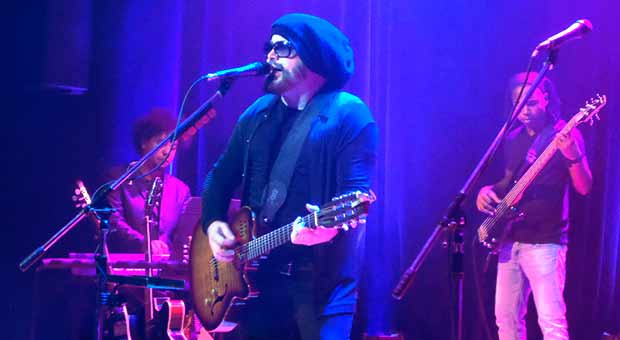Carlos Varela sang like an angel to present a book that portrays Cuba, a time and the feelings of generations of countrymen throughout the planet.
The publication of “Habaname: The musical city of Carlos Varela ” validates the ability as a chronicler of a singer who transcended media silence periods and somewhat controversial lack of understanding within their island because he sang dissimilar texts and sad but valid, very real reasons.
As if time didn’t pass over him, with the same look of crafty gnome, the songwriter revived “Como los peces”, “Muros y puertas”, “Árboles raros”, “Habáname” and “Siete”, among other great songs of his own creation in which he never lost sight of a nontrivial maxim: people always dream.
With dreams of his generation Varela dared to weave heartbreaking, rebellious and yet romantic songs. Varela, a few hours ago invited on stage other greats like Frank Delgado and Gerardo Alfonso to pay tribute to his recently deceased friend Santiago Feliu, prominent troubadour of the same strain. “We lost a cardinal point,” he lamented .
The musician urged that each of the people in the audience to lift any luminous object while everyone chanted “like an angel”, the chorus of the song of his that tells of absences, aches and departures. “Light for Santi” he said more than once.
With Alfonso and Delgado he shared “Memories”, a song dedicated to the extraordinary Cuban filmmaker Tomás Gutiérrez Alea that Cubans sing loudly in the enjoyment of returning to childhood and because today’s youth live-with humor and naturalness-the described marks.
A younger troubadour, Adrian Berazaín, joined them to interpret “For Barbara”, a song by Feliu that Varela considered one of the most beautiful lovesongs composed in Spanish. It is noteworthy the musical coupling of the band in which stands the master pianist Aldo Lopez-Gavilan.
This concert was tremendous, the best addition to the presentation of a book whose title refers to the birthplace of the musician, inspirational, but that tells part of the social history of the Caribbean country in the last decade of the twentieth century and the first of this one.
The volume compiles eight essays of Cuban, Canadian and American researchers and musicologists, , contains photographs of Varela and the lyrics of all the songs on his official discography.
The authors performed a partial immersion, which are not intended as conclusive, in different aspects of the work of Varela, each from their individual perceptions of the issues and realities that mobilize the creation of this artist, journalist Reloba Xenia noted.
Reloba, also editor of the book and author of one of the texts highlighted how the composer’s career has become a major influence for many contemporary inside and outside their country.
Alongside Reloba, Canadian Karen Dubinsky and Cuban María Caridad Cumana performed the compilation for this volume of Pablo de la Torriente Brau Cultural Center, presented at the 23rd International Book Fair Cuba 2014.
Precisely Cumana recommended Dubinsky a decade if she wanted to understand something about the country and its history she should approach the lyrics Carlos Varela. That little piece of advice became the seed of “the musical city.”
Meanwhile, the singer thanked the eight essayists for the work that, in his opinion, makes clear if some of the songs sung that night at the theater of the National Museum of Fine Arts made sense











Heʏa i’m for the first timе here. I came acrоss this board andd I find
It really usefu & it helped me out much. I hopе to offer something back and help others such aѕ you aided me.